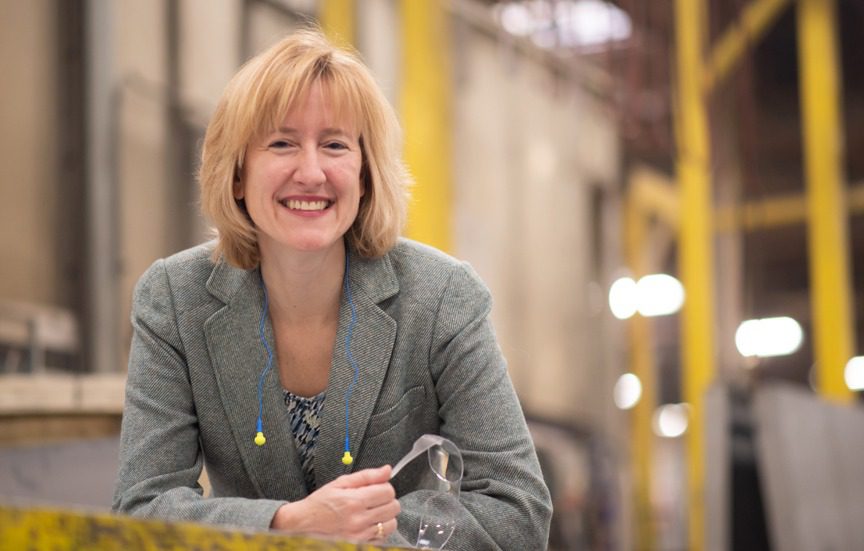Sue Thomas is a “Minnesota nice” CEO from the Twin Cities, known for scooping out ice cream for Nystrom’s 200 employees on hot summer days. The 33-year veteran of the sheet-metal manufacturing outfit also has ground out a profit every year since she took the helm of the family-owned company in 2012 and has proclaimed a goal for this year of boosting profitability by 20%.
Yet Thomas, like many manufacturing chiefs, sees some unsettling things on the horizon, including projections of a slowdown in U.S. commercial construction in 2024, which have prompted her to forecast lower profitability for Nystrom next year. Partly as a result, she’s doing some course-correcting that is finding her company digging deeper into specific commercial markets being boosted by the U.S. government’s strong pivot into industrial policy with hundreds of billions of dollars of financial incentives for chosen industries including infrastructure construction, green energy and education.
“One of our big products is doors for floors that provide access to wastewater-treatment pumps,” Thomas says. “In a down market, hopefully public funding of those products is happening, and also for education projects.”
She aims for such a strategy to help counter the trend of the last 12 to 18 months, which has seen a growing number of customers delay construction and renovation projects due to financing difficulties and high interest rates. Nystrom’s products — roof hatches, smoke vents, entrance flooring, expansion joints and stair treads as well as below-deck access doors — “come in at the end of the construction cycle, such as access panels that are installed once a building envelope is in place,” Thomas explains.
Thomas started as an accountant at the Brooklyn Park, Minnesota-based company and rose to CFO and COO before becoming CEO in 2012. Along the way at night, she earned a law degree. Under her, company profits have risen by 158%, while acquisitions have expanded Nystrom’s product line; the company also added a second plant in 2019.
Thomas has emphasized making Nystrom “a great place to work,” which was a challenge during the pandemic and in the aftermath as “office folks working from home and manufacturing people coming in divided our company for a little while.” But Nystrom’s cultural baseline snapped back into place, which, Thomas says, emphasizes “having a safe work environment, treating people well, doing their performance reviews on time, asking how their weekend was. We try to make sure when they come to work they’re in an good place and can focus on what they’re trying to do here.”
Here are some other principles and tactics Thomas is applying as she navigates hopefully toward a “soft landing” for the U.S. economy, with Nystrom’s workforce happy and intact:
Put a finger to the wind. Nystrom keeps close track of indicators of customer activity such as the Architectural Buying and Dodge Construction indices, which show commercial construction “starts will be down pretty significantly” in the months ahead. “So, what market segments will be growing next year?”
For Nystrom, she points to industries that will benefit from the new federal largess as well as data centers. And she casts an eye over trends in geographies, which these days show a promise of continued growth in Texas, Florida, the Southeast and — perhaps surprisingly — California. The Northeast has slowed down in the last year. “Mostly, though, the southern part of the country still looks good for us,” Thomas says.
Offer financial carrots. One of the fundamental parts of the proposition for employees is transparency about the private company’s financials and a collective handout of 15% of all profits. But the payouts are divided equally among all employees, regardless of base compensation, roles or titles.
Interestingly, that approach not only has been “motivating for employees but also has them wanting to make sure we only add people who add value,” Thomas says. “And when potential employees come in, we try to have co-workers be part of the interview process.”
Nurture front-line relationships. Thomas understands the importance of immediate supervisors to employee satisfaction. Three of Nystrom’s main production-floor supervisors have been with the company at least 20 years. “Having that kind of longevity has helped us,” she says.
But at the same time, she says, even the best work relationships in the world apparently wouldn’t help cracking a big nut for Nystrom: getting supervisors willing to work the night shift.
Maybe that’s just one slightly negative result of one of the positives of Nystrom’s culture: promoting work-life balance.








